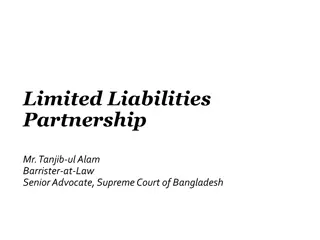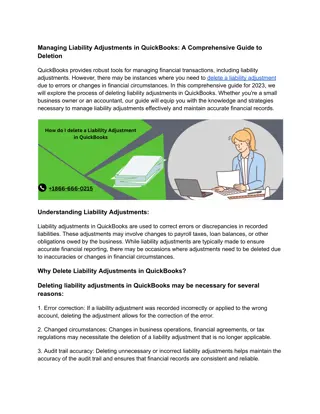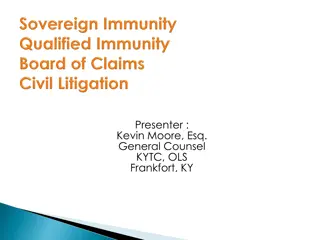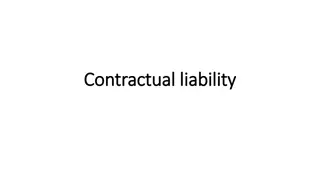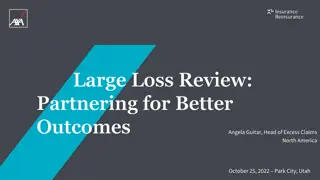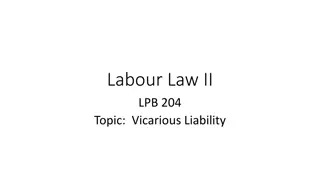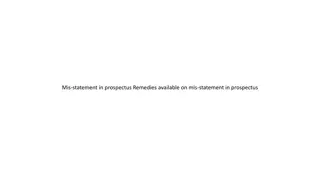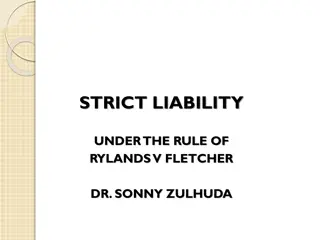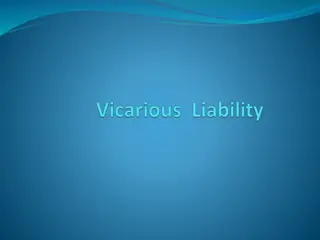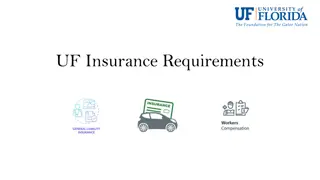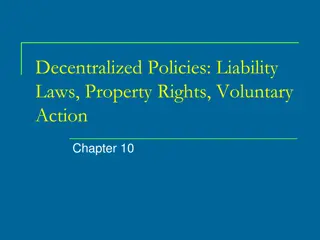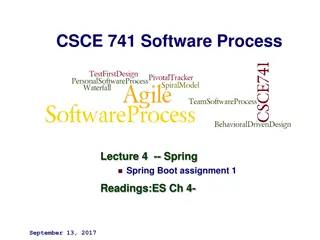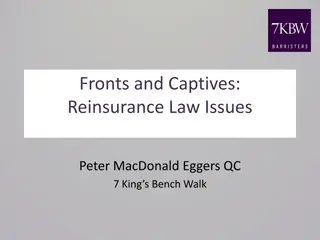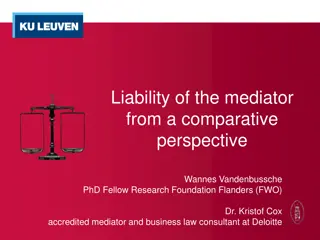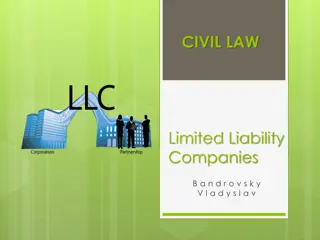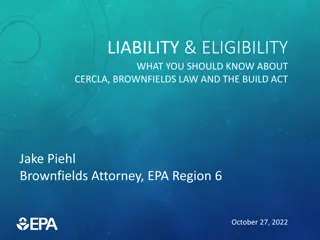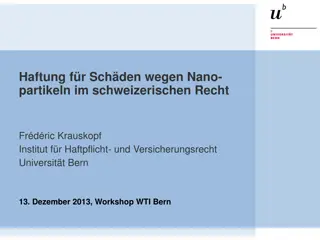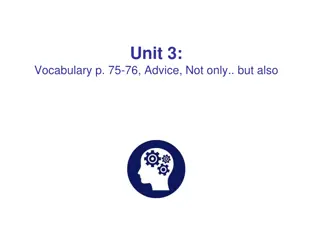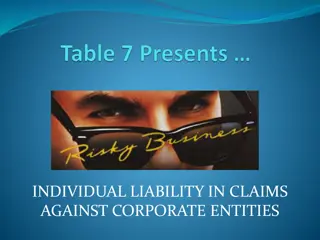
Reinsurance Contract Disputes at ARIAS U.S. 2025 Spring Conference
Explore recent cases involving insureds' direct claims against reinsurers, including court rulings and disputes over contractual relationships. Learn from panelists at the ARIAS U.S. 2025 Spring Conference in Coral Gables, FL.
Download Presentation

Please find below an Image/Link to download the presentation.
The content on the website is provided AS IS for your information and personal use only. It may not be sold, licensed, or shared on other websites without obtaining consent from the author. If you encounter any issues during the download, it is possible that the publisher has removed the file from their server.
You are allowed to download the files provided on this website for personal or commercial use, subject to the condition that they are used lawfully. All files are the property of their respective owners.
The content on the website is provided AS IS for your information and personal use only. It may not be sold, licensed, or shared on other websites without obtaining consent from the author.
E N D
Presentation Transcript
Insureds' Direct Claims Against Reinsurers: Intentional, Unintentional, and Surprise Direct Liability May 1, 2025 ARIAS U.S. 2025 Spring Conference | April 30 - May 2, 2025 | Coral Gables, FL | www.arias-us.org
Panelists Elizabeth Kniffen, Zelle LLP (moderator) Jonathan Bank, Arbitrator Keith Kaplan, Anselma Capital Ellie Kennedy, United Educators John Glowacki, RiverStoneResources ARIAS U.S. 2025 Spring Conference | April 30 - May 2, 2025 | Coral Gables, FL | www.arias-us.org
Insureds Direct Claims Against Reinsurers ARIAS U.S. 2025 Spring Conference | April 30 - May 2, 2025 | Coral Gables, FL | www.arias-us.org
Courts Finding No Direct Liability to Insureds ARIAS U.S. 2025 Spring Conference | April 30 - May 2, 2025 | Coral Gables, FL | www.arias-us.org
Vantage Commodities Fin. Servs. I, LLC v. Assured Risk Transfer PCC, LLC, 31 F.4th 800 (D.C. Cir. 2022) Insured commercial lender brought action against credit insurer's reinsurers, among others, asserting breach of contract, negligence, and related claims. The court affirmed the district court's dismissal of Vantage's breach of contract and declaratory judgment claims because Vantage failed to plead facts sufficient to show a contractual relationship with the Reinsurers. The Court also affirmed the district court s grant of summary judgment for the Reinsurers of Vantage s remaining claims. In this regard, Vantage pointed to no record evidence of any consideration to support its alleged implied contract with the Reinsurers, or any evidence to support its promissory estoppel or unjust enrichment claims. ARIAS U.S. 2025 Spring Conference | April 30 - May 2, 2025 | Coral Gables, FL | www.arias-us.org
Tellone Pro. Ctr., LLC v. Allstate Ins. Co., 562 F. Supp. 3d 757 (C.D. Cal. 2022) Insured brought action against its insurer (Allstate) and Allstate s reinsurer (Hartford) for equipment breakdown coverage to following denial of its claim for alleged vandalism of air-conditioning compressors in 40-year-old system. Allstate and Hartford filed motions for summary judgment. The Court found that Allstate did not violate California s Unfair Competition Law by entering into reinsurance agreement for equipment breakdown coverage with Hartford. And, all of the evidence provided showed that Hartford was a reinsurer, as opposed to a party to the Policy or an underwriter of the Policy. Further, there was no evidence that Hartford assumed the role of anything other than a reinsurer. In this regard, Allstate remained ultimately responsible for paying out the claim to Tellone. While the reinsurance contract provides Hartford with the authority to participate in the investigation and settlement of claims, it does not transform Hartford s role into that of an underwriter. Because Tellonefailed to produce admissible evidence to show that a genuine issue of material fact exists as to whether Hartford acted as a reinsurer, the Court granted Allstate s motion for summary judgment with respect to Tellone'sUCL claims. For the same reasons, the Court also granted Hartford s motion for summary judgment. ARIAS U.S. 2025 Spring Conference | April 30 - May 2, 2025 | Coral Gables, FL | www.arias-us.org
Fla. Ice Arenas, Inc. v. Nat'l Cas. Co., 2021 WL 12310883 (S.D. Fla. Jan. 21, 2021) Plaintiff filed suit against Hartford and National. Its complaint grouped the defendants together as the Insurance Company and made all allegations against the Insurance Company regarding policy at issue and the alleged breach thereof for failure to pay for damages to Plaintiff's insured property sustained due to Hurricane Irma. The Policy at issue is between Plaintiff and National Hartford alleged in its Amended Answer and Affirmative Defenses that Hartford is the reinsurer and only has a contract with National it does not have a contract with Plaintiff nor is it a party to the policy issued to Plaintiff. Accordingly, Hartford brought a motion for judgment on the pleadings arguing that there is no contractual obligation and no privity of contract between Plaintiff and Hartford to support a breach of contract action. The Court agreed with Hartford. Plaintiff's argument that perhaps it could be able to assert some sort of claim against Hartford if Plaintiff examined the contract between National and Hartford does not negate that, as pled, Plaintiff's Complaint fails to state a claim for breach of contract against Hartford. While it does not appear likely that this claim can be salvaged, in abundance of caution the Court will dismiss this count without prejudice with leave to amend. ARIAS U.S. 2025 Spring Conference | April 30 - May 2, 2025 | Coral Gables, FL | www.arias-us.org
Health First Health Plans, Inc. v. Am. Nat'l Ins. Co., 2021 WL 4169211 (S.D. Tex. Sept. 13, 2021), report and recommendation adopted, 2021 WL 4458754 (S.D. Tex. Sept. 29, 2021) American National argued that Health First's statutory claims must be dismissed because neither the contract nor the Reinsurance Agreement gave Health First the right to sue its reinsurer, American National, for violations of the Texas Insurance Code. The Court rejected Health First s arguments that: (1) the Reinsurance Agreement is not true reinsurance issued between two insurance companies; (2) the statute only bars claims filed by the original insured against its insurer's reinsurer, but not claims filed by an insurer against its reinsurer; and (3) there is no language in the Code that precludes an insurer from bringing a cause of action against its reinsurer. The Court found that Texas law prohibits extra-contractual claims brought against reinsurers unless specifically authorized by a reinsurance contract or a separate written agreement. It does not matter whether the party bringing the claim is an original insured, a policyholder, or a reinsured. ARIAS U.S. 2025 Spring Conference | April 30 - May 2, 2025 | Coral Gables, FL | www.arias-us.org
Courts Finding a Path for Direct Liability ARIAS U.S. 2025 Spring Conference | April 30 - May 2, 2025 | Coral Gables, FL | www.arias-us.org
Koken v. Legion Ins. Co., 831 A.2d 1196, 1209 (Pa. Commw. Ct. 2003), aff'd sub nom. Koken v. Villanova Ins. Co., 583 Pa. 400, 878 A.2d 51 (2005) The case arose in the context of the liquidation of an insolvent fronting insurance company (Legion) reinsured by several reinsurers. Policyholders intervened and sought direct access to reinsurance proceeds. The court held that certain policyholders as third-party beneficiaries under the reinsurance contract could assert a right under the reinsurance contract(s) directly against the reinsurer. Here, the insurer acted as a fronting company [that] bore no true underwriting risk and insureds were policyholders in name only; in effect, they were self-insureds that used [insurers] as the means of obtaining stop- loss coverage from a reinsurer. ARIAS U.S. 2025 Spring Conference | April 30 - May 2, 2025 | Coral Gables, FL | www.arias-us.org
Koken v. Legion Ins. Co., 831 A.2d 1196, 1209 (Pa. Commw. Ct. 2003), aff'd sub nom. Koken v. Villanova Ins. Co., 583 Pa. 400, 878 A.2d 51 (2005) The court recognized that its holding constituted an exception to the general rule that applies in the traditional insurer/reinsurer context that policyholder claimants do not have a direct right to access reinsurance proceeds, to be determined on a case-by-case basis: [A] determination of whether an original insured may sue a reinsurer directly must be made on a case-by-case basis, viewing the plain language of the agreement in light of the generally recognized functions and purposes of reinsurance. Pennsylvania courts have demonstrated a willingness to review the relationship between such parties on a case-by-case basis and evolve exceptions to the general rule where the agreement itself, or the relationships among the reinsurer, the reinsured and the original insured, extend beyond the realm of traditional reinsurance and evidence an intent to create third-party beneficiary status for the original insured. Id., at 1236, citing Mellon v. Sec. Mut. Cas. Co., Pa. Com. Pl., No. NO. 3022., 5 Phila.Co.Rptr. 400, 405 (Apr. 15, 1981) (emphasis in original). ARIAS U.S. 2025 Spring Conference | April 30 - May 2, 2025 | Coral Gables, FL | www.arias-us.org
Matter of Gulf Inland Contractors, Inc., 2024 WL 4818714 (E.D. La. Nov. 18, 2024) Clear Spring filed a second Motion to Dismiss Direct Action Claims Against Unnamed Reinsurers Asserted in Great American Insurance Company s Third Party Complaint. The Court denied the motion. Clear Spring argued that the reinsurance agreements all contain a provision that explicitly states that reinsurance does not confer any rights to any third parties. Great American contended that Clear Spring did not provide the risk allocation provisions of the agreements, and that further discovery would reveal Clear Spring is a fronting company. ARIAS U.S. 2025 Spring Conference | April 30 - May 2, 2025 | Coral Gables, FL | www.arias-us.org
Matter of Gulf Inland Contractors, Inc., 2024 WL 4818714 (E.D. La. Nov. 18, 2024) Under Louisiana s Direct Action Statute, La. R.S. 22:1269, generally, an insured or a substantive third party beneficiary may not directly sue an insurer's reinsurers. However, an insured may directly sue an insurer's reinsurers pursuant to the statute when the reinsurance agreement is a contract for liability, rather than loss (i.e., indemnity). Accordingly, if there is language in a reinsurance agreement indicating that the reinsurer agreed to assume and carry out directly with the policyholder any of the policy obligations of the ceding insurer then the reinsurance agreement is one of liability. The Court found Great American s argument compelling. In this regard, in a fronting arrangement, the insurer may issue policies on behalf of another company but retain limited or no actual risk. This type of structure raises questions regarding the nature of Clear Spring's role and whether it is the true party responsible for the policies obligations. Therefore, the factual issues required denial of the motion to dismiss. ARIAS U.S. 2025 Spring Conference | April 30 - May 2, 2025 | Coral Gables, FL | www.arias-us.org
Frye v. Erie Ins. Co., 250 W. Va. 245, 902 S.E.2d 794 (2024) Frye filed suit against Erie for damage to his home due to underground mine subsidence. Erie moved for judgment on the pleadings, arguing that under West Virgina Code, the Board of Risk Insurance and Management ( BRIM ) had the exclusive authority to adjust the claim, so Erie could not have breached the policy when Frye s claim was denied. The court denied Erie s motion. Following discovery, Erie moved for summary judgment, reiterating its earlier arguments. The court granted Erie s motion, holding that: [a]bsent(1) fraud, (2) any wrongful conduct occurring between the time of receiving notice of a mine subsidence claim and transferring the claim to BRIM (e.g., delay in transferring the case to BRIM), and/or (3) any wrongful handling of claims other than mine subsidence, an action for breach of contract may not be maintained against insurer ... In this case, because [Mr. Frye] has presented insufficient evidence which would create genuine issues of material fact for a jury to decide on any of the above three scenarios, [Mr. Frye's] breach of contract claims, as well as his extra contractual claims ... must be dismissed. ARIAS U.S. 2025 Spring Conference | April 30 - May 2, 2025 | Coral Gables, FL | www.arias-us.org
Frye v. Erie Ins. Co., 250 W. Va. 245, 902 S.E.2d 794 (2024) The Court denied Frye s motion to amend or alter the judgment, and Frye appealed. In another case, Higginbotham, the West Virgina court indicated that BRIM's authority over the adjustment of mine subsidence claims conflicted with its nominal status a reinsurer, creating confusion as to what recourse an insured has if aggrieved by a [BRIM] decision. In that case, the court observed that [w]here a typical reinsurance contract is involved, there is no privity ... between the original insured and the reinsurer; as a result, it is generally recognized that the original insured cannot recover directly from the reinsurer. However, BRIM s arrangement is not a traditional reinsurance agreement because the insurer acts merely as an agent of the State and is bound by [BRIM's] decisions And therefore, it [was] necessary for * [BRIM] to set forth in its regulations some procedural guidelines applicable to this variation on the reinsurance contract, lest [f]undamentalprinciples of due process be implicated. The Court ultimately vacated the denial of Frye s Rule 59(e) motion to resolve the constitutionality of the statute and what recourse an insured has if aggrieved by a Board of Risk decision. ARIAS U.S. 2025 Spring Conference | April 30 - May 2, 2025 | Coral Gables, FL | www.arias-us.org
Osterhout v. Morgan, 2023 WL 6163985 (E.D. Okla. Sept. 21, 2023) Plaintiff filed a garnishment against County Reinsurance, Limited ( CRL ), the issuer of a reinsurance contract with Association of County Commissioners of Oklahoma Self Insured Group ( ACCO-SIG ) seeking recovery of insurance proceeds. CRL filed a motion to dismiss, claiming that defendant Kendall Morgan had no rights with respect to the reinsurance agreement between ACCO-SIG and CRL and that CRL s liability is contingent and not subject to garnishment. In response, plaintiff argued that discovery indicated CRL was financially responsible for ACCO-SIG claim liability in excess of $500K, up to the policy limits, and that ACCO-SIG has an equity ownership interest in CRL. Additionally, a letter from ACCO-SIG indicates that CRL s involvement in the claims process is more than that of a reinsurer. ARIAS U.S. 2025 Spring Conference | April 30 - May 2, 2025 | Coral Gables, FL | www.arias-us.org
Osterhout v. Morgan, 2023 WL 6163985 (E.D. Okla. Sept. 21, 2023) The court explained: Reinsurance is essentially insurance for insurance companies. Reinsurance occurs when a carrier (the reinsurer ) agrees to cover losses experienced by an insurer (the cedent ) for certain covered risks. These reinsurance contracts allow the reinsured to distribute its risk of loss among reinsurers. There are two types of reinsurance contracts: facultative and treaty. A facultative reinsurer insures part or all of a single insurance policy, with underwriting occurring as to each reinsured policy. A treaty reinsurer insures specified classes of a ceding insurer's policies. CRL represents that the reinsurance in this case was facultative. ARIAS U.S. 2025 Spring Conference | April 30 - May 2, 2025 | Coral Gables, FL | www.arias-us.org
Osterhout v. Morgan, 2023 WL 6163985 (E.D. Okla. Sept. 21, 2023) It is a basic rule of insurance law that the existence of a reinsurance contract does not allow an insured to proceed directly against the reinsurer, generally even if the original insurer becomes insolvent. It is well settled that the original insured cannot maintain a direct action against a reinsurer and correspondingly, the reinsurer has no direct liability to the original insured, based on the fact that the original insured is neither a party to the reinsurance contract or in privity. However, there are exceptions to this general rule. Even in the absence of an express provision, such a right may be implied through the conduct of the reinsurer. Where the original insured consistently deals directly with the reinsurer, bypassing the original insurer, the reinsurer may become directly liable to the insured. The Court found indications that CRL may be functioning as a primary insurer and therefore denied CRL s motion to dismiss. ARIAS U.S. 2025 Spring Conference | April 30 - May 2, 2025 | Coral Gables, FL | www.arias-us.org
Midtown Hotel Grp. LLC v. Selective Ins. Co. of Am., 2023 WL 3603677 (D. Ariz. May 23, 2023) Midtown filed suit against its insurer regarding coverage warranted under its policy after an air- conditioning system malfunctioned and flooded the hotel. Midtown also asserted claims against Hartford, Selective sreinsurer, on the basis that Hartford investigated the claim and allegedly carried out many of the actions forming the basis for Midtown's complain. Hartford filed a motion to dismiss on the basis that Hartford has no contractual relationship with Midtown. The Court concluded that the facts as alleged fell within Arizona s direct-liability exception, and thus declined to dismiss Midtown s bad faith tort claim against Hartford. Furthermore, the Court found that Midtown has stated a claim for breach of the implied covenant of good faith against Hartford, and thus, declined to dismiss the breach of contract claim. The Court also declined to dismiss Midtown s claim for tortious interference with contract against Hartford. However, the Court dismissed Midtown s claim for aiding and abetting. ARIAS U.S. 2025 Spring Conference | April 30 - May 2, 2025 | Coral Gables, FL | www.arias-us.org
CC Metals & Alloys, LLC v. Am. Int'l Specialty Lines Ins. Co., 2022 WL 3705003 (W.D. Ky. Aug. 26, 2022) This action involves a coverage dispute between CCMA and defendants with respect to losses suffered by CCMA arising from pollution-related clean-up costs. CCMA sued AIG Specialty, which issued a Pollution Legal Liability policy to CCMA, as well as Fortitude Re based on information and belief that AIG Specialty has transferred all assets, liabilities, and obligations related to the Policy at issue here to Defendant Fortitude Re. Fortitude Re moved to dismiss all CCMA's claims against it based on a lack of contractual agreement between CCMA and Fortitude. Relying on the Millennium case, the Court noted that the reinsurance agreement between AIG Specialty and Fortitude Re had not yet been provided to the Court. Therefore, without the explicit language of the contract, the Court could not thoroughly review to make a determination regarding potential liability. While CCMA s allegations in its complaint leave much to be desired, CCMA presented a plausible argument for Fortitude Re s potential liability and additional information may come out in discovery. Therefore, dismissal was not appropriate. ARIAS U.S. 2025 Spring Conference | April 30 - May 2, 2025 | Coral Gables, FL | www.arias-us.org
Leonberger v. Missouri United School Ins. Council, 2016 WL 2994332 (Mo. Ct App.) Insured school bus driver's third-party beneficiary claims against purported reinsurer for bad faith refusal to settle, bad faith refusal to defend, and breach of fiduciary duty did not fall within scope of reinsurance agreement's mandatory arbitration clause. Applying the plain language of the arbitration clause the court decided that disputes subject to arbitration under the agreement were limited to disputes between the reinsured and the reinsurer. The fact that the arbitration clause did not explicitly exclude third-party claims did not mean that such claims were implicitly included within the scope of the clause ( Such an argument runs contrary to basic tenets of contractual interpretation. , id., at 12). ARIAS U.S. 2025 Spring Conference | April 30 - May 2, 2025 | Coral Gables, FL | www.arias-us.org
Leonberger v. Missouri United School Ins. Council, 2016 WL 2994332 (Mo. Ct App.) The court explained that [o]rdinarily, the original insured has no interest in the reinsurance , because the contract of insurance and the contract of reinsurance are totally distinct and unconnected . Id., at 11, citing J.C. Penney Life Ins. Co. v. Transit Cas. Co. in Receivership, 299 S.W.3d 668, 674 (Mo.Ct. App.2009). However, the court continued by pointing out that barring any statutory restrictions against it, a reinsurance contract may be drafted in such a way as to make the reinsurer liable to both the reinsured company and the original insured. If the reinsurer assumes the liability of the reinsured company on its policies, then the policyholders, or their privies, may directly enforce this liability against thereinsurer .Id. ARIAS U.S. 2025 Spring Conference | April 30 - May 2, 2025 | Coral Gables, FL | www.arias-us.org

